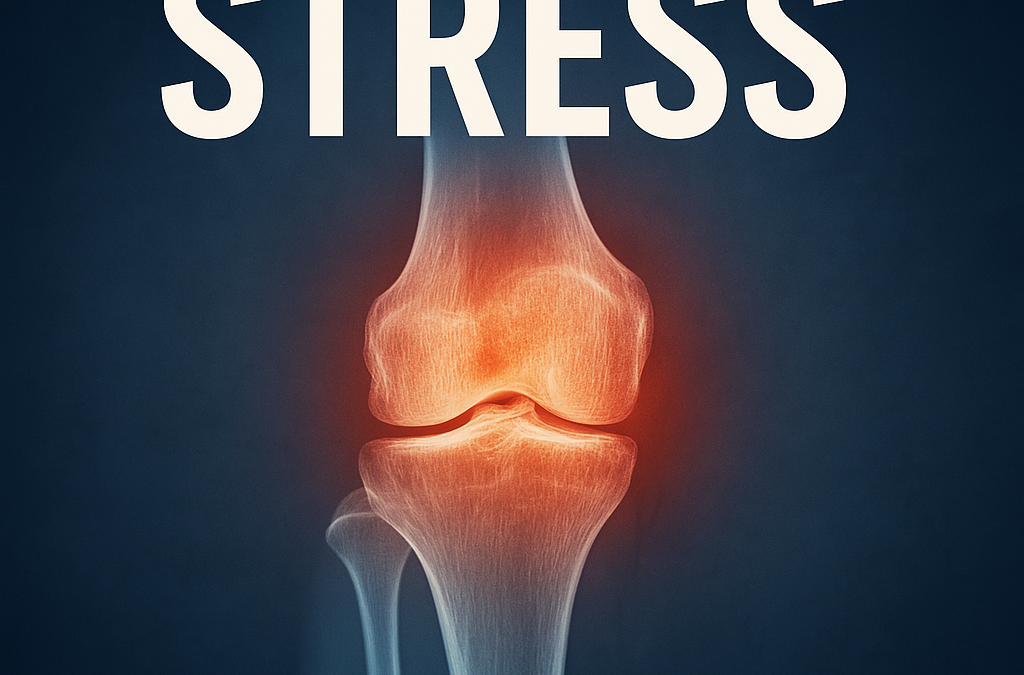Stress can contribute to joint problems through direct and indirect pathways. Although stress itself is not typically the sole cause of chronic joint issues, it can worsen existing problems and trigger symptoms that complicate the management of these conditions. Below is an overview of how stress affects joint health and the types of issues that may arise.
The Stress Response and Inflammation
How it happens:
- Under stress, the body increases production of cortisol and other stress hormones.
- Usually, cortisol helps regulate inflammation. However, cortisol’s effectiveness can diminish when stress is prolonged or chronic, leading to chronic low-level inflammation.
- Heightened inflammation can aggravate joint tissues, worsen pain, and accelerate damage.
Potential issues:
- Flare-ups in autoimmune conditions
- Increased joint stiffness and swelling due to intensified inflammatory response
Muscle Tension and Joint Misalignment
How it happens:
- Stress can lead to ongoing muscle tension—particularly in the neck, shoulders, and back—which alters normal posture and may impose additional strain on joints.
- Over time, tight muscles pull unevenly on the joints, potentially leading to misalignment or abnormal joint wear and tear.
Potential issues:
- Chronic pain or discomfort in frequently used joints (knees, hips, shoulders)
- Neck and back pain due to misalignment of the spine
- Temporomandibular joint (TMJ) dysfunction, linked to jaw clenching or grinding under stress
Altered Pain Perception
How it happens:
- Chronic stress heightens overall sensitivity to pain by influencing neurotransmitters in the brain.
- A stressed body and mind are more likely to perceive pain signals more acutely or interpret mild discomfort as painful.
Potential issues:
- Exacerbation of existing joint pain
- Lower pain threshold, making routine joint aches feel more severe
Lifestyle Factors Worsened by Stress
How it happens:
- People under chronic stress may experience fatigue and reduced motivation, contributing to a more sedentary lifestyle or reliance on unhealthy coping mechanisms (e.g., overeating and substance use).
- Weight gain from stress-related eating habits increases the load on weight-bearing joints, such as the knees and hips.
- Poor sleep quality, often linked to stress, further diminishes the body’s capacity to repair joints and maintain healthy tissue.
Potential issues:
- Osteoarthritis progression, especially in the knees and hips, from added weight or lack of movement
- Muscle weakness from inactivity, putting more strain on joints
- Slower recovery from joint injuries or flare-ups
Tips for Managing Stress to Protect Joint Health
- Regular Exercise
-
- Low-impact activities like walking, cycling, or swimming help maintain joint function and reduce stress hormones.
- Mind-Body Techniques
-
- Yoga, tai chi, meditation, and deep breathing can lower cortisol levels and help relax tense muscles.
- Healthy Sleep Routine
-
- Aim for 7–9 hours of quality sleep to support the body’s repair processes.
- Balanced Diet
-
- Anti-inflammatory foods (e.g., fruits, vegetables, whole grains, omega-3 fatty acids) help control joint inflammation.
- Professional Support
-
- Counseling, stress management training, or physical therapy can be beneficial in preventing stress from escalating joint problems.
- Supplemental Support
- Stress: Dietary supplements with proven impact on stress and mood, such as affron®, Zembrin®, Ashwagandha, L-theanine, etc.
- Joint Support: Mobilee®, Collavant n2®, Glucosamine, Chondroitin, Curcumin (HydroCurc®), Levagen®+, etc.
Putting a Bow on the Topic
- Chronic stress disrupts the normal hormonal balance, contributing to joint inflammation and extending existing pain.
- Muscle tension and poor posture brought on by stress can put excess strain on joints, worsening conditions such as arthritis or back/neck pain.
- Lifestyle choices influenced by stress (e.g., lack of exercise, poor diet, insufficient sleep) further compromise joint health.
- Effective stress management techniques can help minimize these adverse effects and improve joint function and comfort.
By understanding the physiological and behavioral links between stress and joint health, individuals can take proactive measures—through exercise, proper self-care, and professional assistance—to maintain both their stress levels and joint health more effectively.


